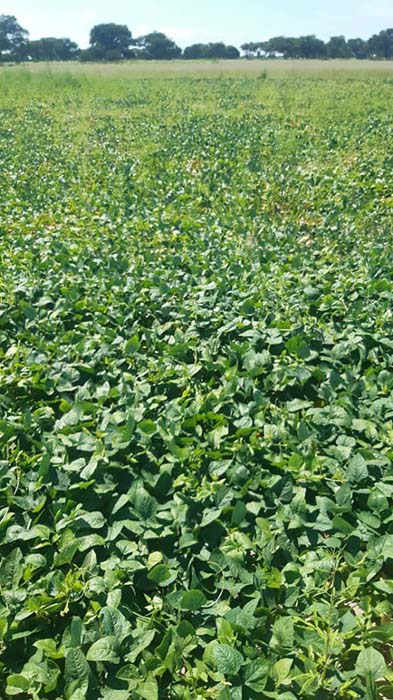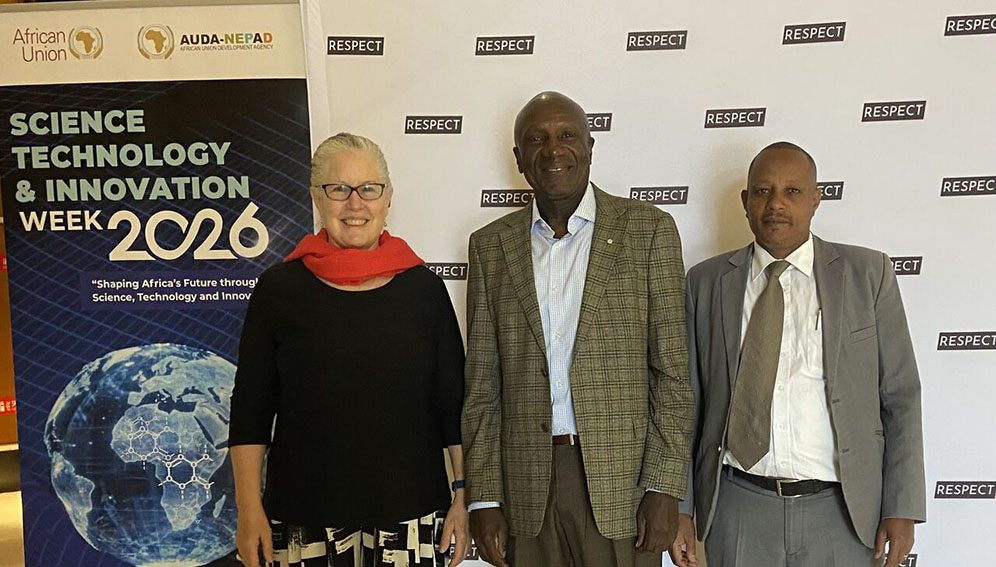SGCI News
[NAMIBIA] A lack of protein is a major contributor to malnutrition in low- and middle-income countries, where many people’s diets are heavily dependent on staple crops. To tackle this problem in Namibia,…
[NAMIBIA] A lack of protein is a major contributor to malnutrition in low- and middle-income countries, where many people’s diets are heavily dependent on staple crops.
To tackle this problem in Namibia, researchers started a food and nutrition project to train farmers in the use of a biofertiliser to produce protein-enriched legumes.
The project, led by researchers from the Namibia University of Science and Technology, introduces smallholder farmers in the Mayana community of Kavango East region to biotechnology techniques, in an effort to address critical challenges in agricultural productivity and nutrition.
Natilia Rengi, a farmer from the community, once struggled to produce enough food for her family of 12 but has seen yields swell since adopting the biofertiliser.
“We didn’t use to cultivate as much,” she says.
“[But] I can proudly say we harvest enough now to feed our family.”
For Rengi, the project means the difference between struggling to sustain her large family and feeding them nutritious meals.
Her story is one of many from the region, where farmers are seeing an improvement in their food production and livelihoods because of this initiative, which is funded by the Science Granting Councils Initiative.
According to Oswald Mughongora, senior program officer for grant management at Namibia’s National Commission on Research, Science, and Technology, the scheme aligns with the country’s broader goals of climate-smart agriculture and indigenous knowledge integration.
The project, named the Food Security and Nutrition Improvement through Protein-Rich Legume and Low-Cost Biotechnology in Namibia (FOODSECBIO), started in 2021 and is on track to be completed by July 2025.
Five biofertilisers
“One of the key outputs of this initiative is the development of a locally produced biofertiliser,” Mughongora says.
He says the project helps address soil fertility as well as malnutrition and food security concerns in Namibia.
Percy Chimwamurombe, the lead researcher of the project from the Namibia University of Science and Technology, says his team has developed five biofertilisers. They started by identifying the bacteria that are most suitable for promoting growth.
The researchers isolated bacteria from the soil environment of legume plants and selected the bacteria with plant growth-promoting characteristics in the laboratory.
“We were mostly interested in their nitrogen-fixing capacity,” says Chimwamurombe.
Around 30 farmers have so far received training on how to use the biofertilisers. Farmers were also trained in crop production methods for cowpea, pearl millet, and bambara nut, which are all rich in protein, and on how to produce protein-enriched pearl millet flours to feed infants.
Effective farming
Sofia Kamburu, a 34-year-old farmer, says she has expanded her crops to include beans, pearl millet, groundnuts, and bambara nuts.

“We’ve learned how to plan and when to plant, depending on different seasons,” she says.
“In the past, we relied on good rains in November and December, however this year we prepared our fields before the rainy season, waiting for the rains in January for better germination.”
Adopting biofertilisers and improved soil preparation techniques has enhanced her agricultural knowledge, she adds.
Alta Ngoma, 30, had been unemployed for three years when she learned new harvesting skills through the project. She now hopes to cultivate her own field in the future.
“This project has completely changed my life,” says Ngoma.
“Previously, I had no income or experience. We often struggled to buy maize meals, which cost around 150 Namibian dollars [US$8.3] for a ten-kilogram bag.
Since October, Ngoma has been earning an income, enabling her to afford her child’s school fees.
Another female farmer, Apolionia Kavahu says: “We have learned how to farm effectively. I once doubted that anyone could make a living through farming, but now we can also teach our children how to do it better in the future.”
Child malnutrition
Chimwamurombe believes the FOODSECBIO project could play an important role in providing alternative nutrition to combat child malnutrition in the country.
He is confident that protein deficiency is a problem that this project can defeat if all concerned parties unite on the issue.
Namibia’s first PhD holder in plant breeding, Lydia Horn, stresses that seed availability is important in promoting food security and combating hunger.
She says: “Jobs can be created and food security can be improved by making seeds available at a low price so that everyone can grow their meals.”
This piece was written by Charlotte Nambadja.
Related News
Building Africa’s science future: inside the SGCI alliance
As Phase 3 of the Science Granting Councils Initiative launches on the margins of the African Union Summit in Addis Ababa last week, the SGCI Alliance Chair explains why this moment marks a decisive turning point for African science. Cephas Adjei Mensah describes what is…
Open call: Support for science granting councils in Sub-Saharan Africa
The International Development Research Centre (IDRC), through the Science Granting Councils Initiative (SGCI), has launched a call for proposals to support science granting councils in Sub-Saharan Africa in the establishment and operationalisation of the Capacity Strengthening Hub under Phase III of the SGCI-3. The Hub…
SGCI phase 3: USD 42M boost for Africa’s STI agenda
It was an exhilarating moment as the Science Granting Councils Initiative (SGCI) Phase 3 funding announcement was officially made yesterday during the Science, Technology, and Innovation (STI) Week 2026, held in Addis Ababa, Ethiopia. The STI Week, organised by AUDA-NEPAD and the African Union and…
SGCI funded projects
Rwanda’s integrated approach to sustainable agriculture and nutrition
Project Titles & Institution Areas of Research Number of Projects being funded Project Duration Grant Amount In-Kind Distribution Council Collaboration with other councils





